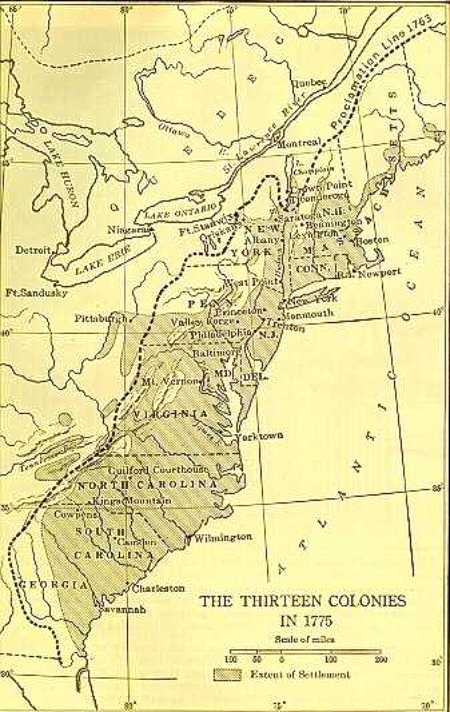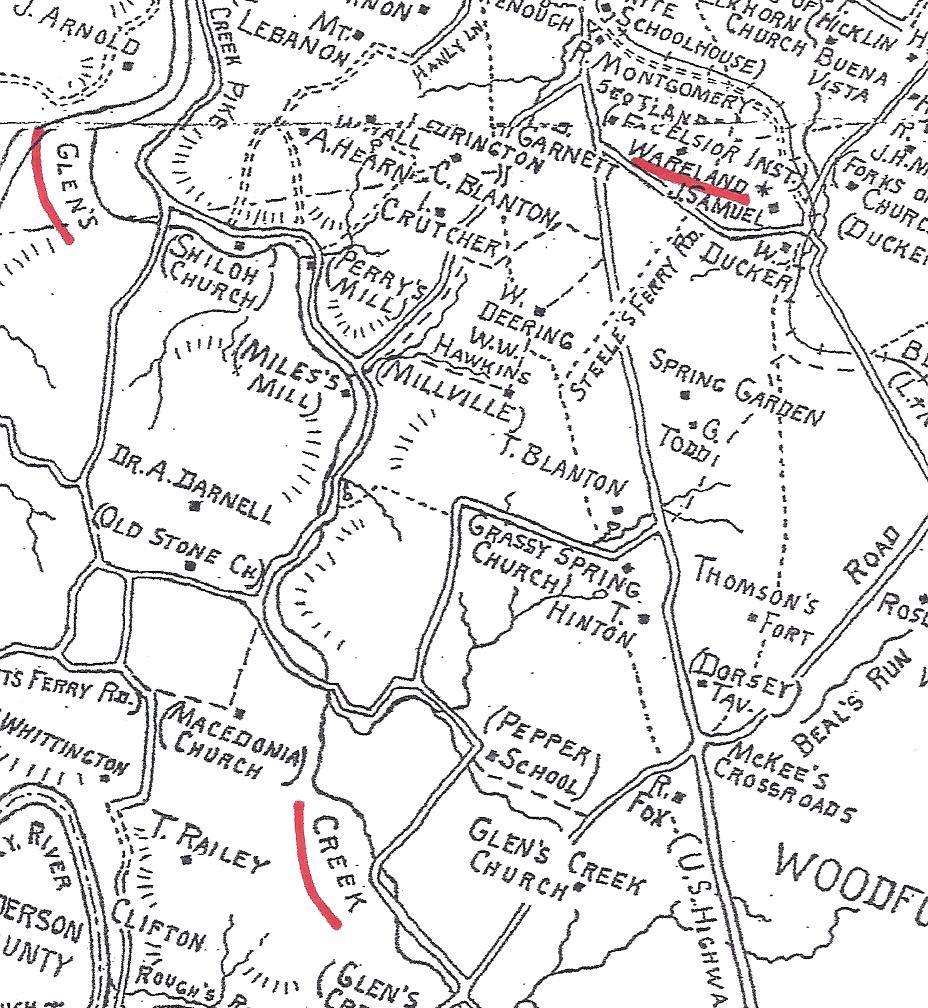
Chapter 9
Son ~ Charles Ware
By the time Caty Todd Ware and James had their next child, the original 13, individualistic colonies of Connecticut, Delaware, Georgia, Maryland, Massachusetts, New Hampshire, New Jersey, New York, North Carolina, South Carolina, Pennsylvania, Rhode Island and Virginia had two major things in common: Great Britain as their enemy and the desire to go to war to fight that enemy.
MAP OF THE 13 COLONIES IN 1775

Just four short months prior to the birth of baby Charles Ware, on April 18, 1775, Paul Revere made his famous ride to warn the colonists of the British plans. “Whenever there was an important message to be carried to the sister colonies, Paul Revere was the man to whom it was entrusted to be conveyed as speedily as horses' legs could take him, and in the petty matters of local administration he also helped as befitted the good citizen.” (Ref. 2257) His story would go down in history as a stirring account of how enthusiastic colonists “answered the call” to defend their rights. “Mounted on Deacon Larkin’s horse, Revere set off to alarm the country, and in his own words, ‘I awaked the captain of the minute men; and after that, I alarmed every house, till I got to Lexington.’” (Ref. 2257) The country was on the cusp of war, and life, as James and a very pregnant Caty knew it, would be forever changed.
Charles made his appearance on August 19, 1775, in the family home in Virginia. During his childhood, his father would fight in the War for Independence and secure the family’s future in Kentucky. His older brothers were six and four, and his older sisters were just three and two. It is doubtful any of the children were really aware of the momentous activities going on in the world outside their neighborhood. Caty, on the other hand, must have felt great responsibility bringing another life into the world during those turbulent times.
When peace finally arrived and the family made their big move to Kentucky, Charles was only 16 years old. He recorded in his letters that he stayed with his parents for about two years, and then he went back to Virginia to live with his older brother, James III, for a while. He wrote to his niece in later years that “I did not go to live with him (James) until the fall of 1793. We then continued together almost until I married in 1803.” (Ref. 35G)
Charles married Frances Whiting on November 29, 1803. (Ref. 1059, 1067) They were married in Frederick County, Virginia, but after the wedding, the young couple decided to settle in Versailles, Kentucky, and put down their roots for good. (Ref. 1067)
![]() Wedding
record
Wedding
record
Charles and Frances never had any children of their own, but they were surrounded by lots of nieces and nephews. (Ref. 602) There is a deed dated October 8, 1811, that shows “a purchase of 177¼ acres of land for Charles Ware on the waters of Glenn’s Creek.” (Ref. 1027) The paperwork further specifies that “On Oct. 8, 1811, James Stapp and his wife Sally, of Woodford County sold to Charles Ware of Fayette County for the amount of $2,643.00, 177 ¼ acres on waters of Glenn’s Creek to Richard Young’s old line.” (Ref.1038)
 Property
showing Glenn’s Creek
Property
showing Glenn’s Creek

By this time, in 1811, Charles Ware had taken on some of the civic responsibilities that came with his age and his station. In 1810, Kentucky had passed an act “altering the mode of taking in lists of taxable property and changed the way tax commissioners were selected. The law now required county courts to appoint ‘some fit person in the bounds of each militia company to receive and take in all lists of taxable property within the same.’ ” Charles was working in the capacity of a commissioner at this time.
The Fayette County records show that “Charles Ware was assigned to make the appraisal of the personal estate of Richard Blanton for his widow Sally Blanton. It was ordered that Leonard Young, Abraham Ferguson, Abner Wilson, and Charles Ware, or any 3, be appointed to examine and settle the accounts of Carter Blanton as guardian to the heirs of Richard Blanton deceased and also to make a division of the estate among his heirs and legal representatives, and make a report.” (Ref. 1044A) In April, the “inventory of the estate of Richard Blanton deceased was provided by Charles Ware & recorded in the April court.” (Ref. 1043A) At the close of the year, he “served as one of the Commissioners on Dec. 27, 1811 for examining the accounts pertaining to the estate of Richard Blanton deceased.” (Ref. 1043B)
The Fayette County, Kentucky, records also show that “when the precincts of several roads were returned and reported to the Court and ordered established, it was recommended that the following persons be appointed overseers of the various precincts . . . to wit No. 10 Charles Ware, with the report signed by Leonard Young and William Dudley and recorded. Descriptions of the precincts were given.” (Ref.1044A) As part of his job, it was “ordered that Abraham Ferguson, Charles Ware, and Abner Wilson, or any two, be appointed Commissioners to contract for the repairing of a bridge on Hornbacks Mill Road across David’s Fork, to be paid out of next year’s levy.”
(Ref. 1044A)
An 1811 letter written to his brother in Virginia gives insight into how well Charles was doing as a farmer. He wrote:
“I raised, last year, some better than 2 ½ tons [of] hemp which I sold to Capt. John Richardson and son (who has established a Rope Walk on his farm) at seven dollars p. hundred; payable in 12 months, which will expire the 15th of March next. Hemp is worth about $6.00 now. It was up for two weeks only last winter - worth $7.00. I had a good deal of trouble with [the] breaking of my hemp, having taken it almost all up before it was well rotted. Notwithstanding, it passed in great credit. I’ll know better next time.” He went on to add, “I have at last (not without great labor) repaired the fencing in such a manner that with little trouble, [it] will last my lease, and I have 13 acres of hemp a growing that is promising; notwithstanding a severe drought this Spring. From 1 April until the 10th of June was less rain than ever was known (by me) to have fallen in the same months. Our flak and oats will, I fear, not be worth saving. Wheat is good. Corn is very low but looks very well.” (Ref. 341)
Charles’ father also relayed news back to Virginia. James wrote to his son, James Ware III, that he had some of his horses “in Charles Ware’s stables; up to their eyes in the best of feed etc.” He further wrote, “Charles Ware has got a horse that is . . . nearly 16 hands high. He will fit a wagon to a tea. He intends to send him to you if he has an opportunity. Charles Ware made almost 3 tons of hemp last year and has sold it. Charles has got the greatest prospect this year. He will make, I suppose, 4 or 5 tons of it, if it comes in well.” (Ref. 341)
Charles, unlike his siblings, did not have children of his own to help him take care of his property. He did, however, own slaves. They aided him in getting these vital crops in the ground and later in collecting the harvest. Church records for David’s Fork Baptist Church show that two of Charles’ slaves attended worship services there and were baptized; Mary (who died in 1814) and Charles.
(Ref. 2004)
Charles and Fanny prospered in Kentucky. In November 1827, a land transaction between Charles Ware and Cyrus McCracken was recorded. “Witnesses on Nov. 28, 1827 [state] that Cyrus McCracken conveyed to Charles Ware 100 acres, that the said McCracken is to continue in the possession of said land, and use it, but not to waste it, and if in 2 years, McCracken pays to Charles Ware the sum of $1,400.00, possession is to revert to McCracken.”
(Ref. 1039) It was further stated (concerning the arrangement between Charles and Cyrus) that there be an “indenture between Cyrus McCracken & his wife Catherine (of Woodford Co.) a sum of $1,000.00 for a tract of land on the waters of Glenn’s Creek, beginning on William William’s line to the north side of the mill race, 100 acres, dated Nov. 28, 1827.” (Ref. 1038)
In a letter Charles wrote to his niece in 1831, he wrote about his health and mentioned that “I find I decline more than my years speak of.” He died in Kentucky in July of 1839 at the age of 64. His last will & testament was dated July 27, 1839, and was probated in May 1840. His wife, Fanny, was the “Administratrix” of the last will and testament. (Ref. 2003)

Fanny lived as a widow for many years after Charles died. The local newspaper recorded:
“Mrs. Fanny Ware, widow of Charles Ware of Woodford County died in August 1851 at the age of 77.” (Ref. 1069)
Sadly, there were no children from the union of Charles and Fanny to mourn their passing.
![]()